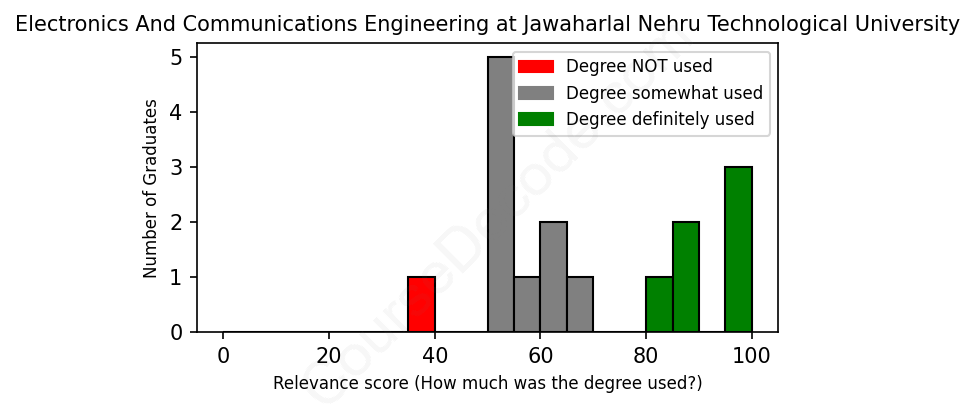
First, some facts. Of the Electronics And Communications Engineering graduates from Jawaharlal Nehru Technological University we've analyzed , here's how many have used (or NOT used) their degree in their career:

These are estimates based on AI analysis of 16 LinkedIn profiles (see below).
The verdict? Slightly above average. Overall, with an average relevance score of 68%, Electronics And Communications Engineering graduates from Jawaharlal Nehru Technological University have a slightly higher likelihood (+1%) of finding work in this field compared to the average graduate across all fields:
And for comparison, here's the chart for all profiles we've looked at across all degrees.
Also, after graduating, 87% of these graduates have pursued further education other than another Bachelor's degree (such as a Masters degree or other), compared to the average across all profiles of 35%. This suggests you may need more than just a Bachelors degree to be competitive as a Electronics And Communications Engineering graduate.
See the details:
|
Relevance score: 89% We think this person has gone into a career highly relevant to their degree. We think this person has gone into a career highly relevant to their degree.
DEGREE INFOGraduated in 2015 from Jawaharlal Nehru Technological University with a Bachelor of Technology in Electronics And Communications Engineering. Also pursued further education since (see below). JOB HISTORY SINCE GRADUATIONSoftware Development Engineer Netcracker Technology Jun 2015 - Jul 2017 Research Assistant - Machine Learning  University of Colorado Denver Oct 2018 - Feb 2019 Research Intern - Computer Vision  National Renewable Energy Laboratory Feb 2019 - Dec 2019 Computer Vision Researcher  Mayachitra, Inc. Dec 2019 - Present Research Engineer - MLOps  UC Santa Barbara Jun 2022 - Present FURTHER DEGREES DONE SINCE GRADUATINGMaster of Science - MSUniversity of Colorado Denver 2017 - 2019 ABOUTI am a Computer Vision Researcher with over 5 years of professional research experience. I am broadly enthusiastic towards machine learning that mimics capabilities of human intelligence. My specific areas of interest include Image forensics, Deepfake synthesis, Signal Processing/Vision based malware detection, and most importantly MLOps. |
The top 10 most common jobs done by the graduates we've analyzed (ranked most common to least) are:
After looking through the job profiles of graduates from Jawaharlal Nehru Technological University who have studied Electronics and Communications Engineering, it’s clear that they have ventured into a variety of roles. Many have taken on positions in data analysis and business intelligence, such as data analysts or business analysts, which leverage analytical and problem-solving skills but often don’t require a deep understanding of electronics or communication principles. There are also quite a few who chose paths in software development, including roles like Software Development Engineer or Full Stack Developer, where programming skills are key. Interestingly, some graduates are even working in more distantly related fields like risk assessment or technical recruiting.
On the flip side, while there are roles directly tied to their engineering education, like Automotive internships and technical positions at companies like Qualcomm or Intel, these represent a smaller portion of the overall job landscape. It seems that many of these graduates have found ways to apply their analytical and technical skills in various sectors beyond pure electronics and communications engineering. So, while some jobs clearly align with their degree, many graduates have ventured into roles that, while they may utilize some skills developed during their studies, do not directly relate to the core principles of Electronics and Communications Engineering. It definitely shows that there are many pathways available for engineers, even if they don’t all stick strictly to engineering concepts!
Here is a visual representation of the most common words in job titles for Electronics And Communications Engineering graduates (this is across all Electronics And Communications Engineering graduates we've analyzed, not just those who went to Jawaharlal Nehru Technological University):

When it comes to graduates from Jawaharlal Nehru Technological University who studied Electronics and Communications Engineering, the career paths they take can vary quite a bit. For many, the first job tends to be in tech roles that align with their engineering background, such as software development, business analysis, or some sort of technical position. For instance, graduates from 2015 have started as software developers and ETL engineers, while those from 2018 began as Java developers. There's a clear trend of many jumping into roles that utilize their technical skills right out of college, which is a solid indicator of a relevant start in their careers.
As they move on, say five or ten years later, it looks like many are still on a relevant track, though there are some who seem to have branched into less directly related fields. Graduates are often found advancing into senior positions at established companies, diving into roles like Senior Software Engineer, Data Analyst, or even Research Engineer. However, it’s worth noting that a few individuals have transitioned into positions like technical recruiters or other roles that aren't strictly engineering-related. So, while many have established good careers in relevant areas, there's a mix of paths. Overall, it seems like a decent chunk of these graduates have done well, but not all have remained within the core of electronics and communications sectors—some have ventured outside, which speaks to both the versatility of their skills and possibly a lack of direct opportunities in their field of study.
Honestly, the Bachelor’s degree in Electronics and Communications Engineering can be pretty challenging, especially at a university like Jawaharlal Nehru Technological University (JNTU), which has a solid reputation. You’ll be diving into a lot of technical concepts like circuit design, signal processing, and communication systems, which can be intense. Plus, there’s a good amount of mathematical and analytical work involved, so if math isn't your strong suit, you might find it a bit tough. That being said, if you’re really interested in the subject and you’re willing to put in the time and effort, it can also be super rewarding! Just be prepared to tackle some complex topics along the way.
Most commonly, in the LinkedIn profiles we've looked at, it takes people 4 years to finish a Bachelor degree in Electronics And Communications Engineering.
Looking at this lineup of graduates from Jawaharlal Nehru Technological University, it seems like they've been on some pretty solid career paths, especially for tech and engineering fields. The earlier grads are mostly in roles that suggest they’ve earned decent salaries, with positions like Senior Engineers and Business Analysts, which generally pay well. Even the recent graduates who started out in internships or as Assistants at big firms like Tata Consultancy Services could end up making good money as they climb the ladder. Overall, it seems like most of these folks are doing alright financially or are set up for future success, so yeah, it looks like they’re making some decent bucks!
Here is a visual representation of the most common words seen in the "about" section of LinkedIn profiles who have a Bachelor degree in Electronics And Communications Engineering (this is across all Electronics And Communications Engineering graduates we've analyzed, not just those who went to Jawaharlal Nehru Technological University). This may or may not be useful:

Here are all colleges offering a Bachelor degree in Electronics And Communications Engineering (ordered by the average relevance score of their Electronics And Communications Engineering graduates, best to worst) where we have analyzed at least 10 of their graduates:
| College | Score | Count |
|---|---|---|
 Jawaharlal Nehru Technological University Jawaharlal Nehru Technological University
|
68 | 16 |